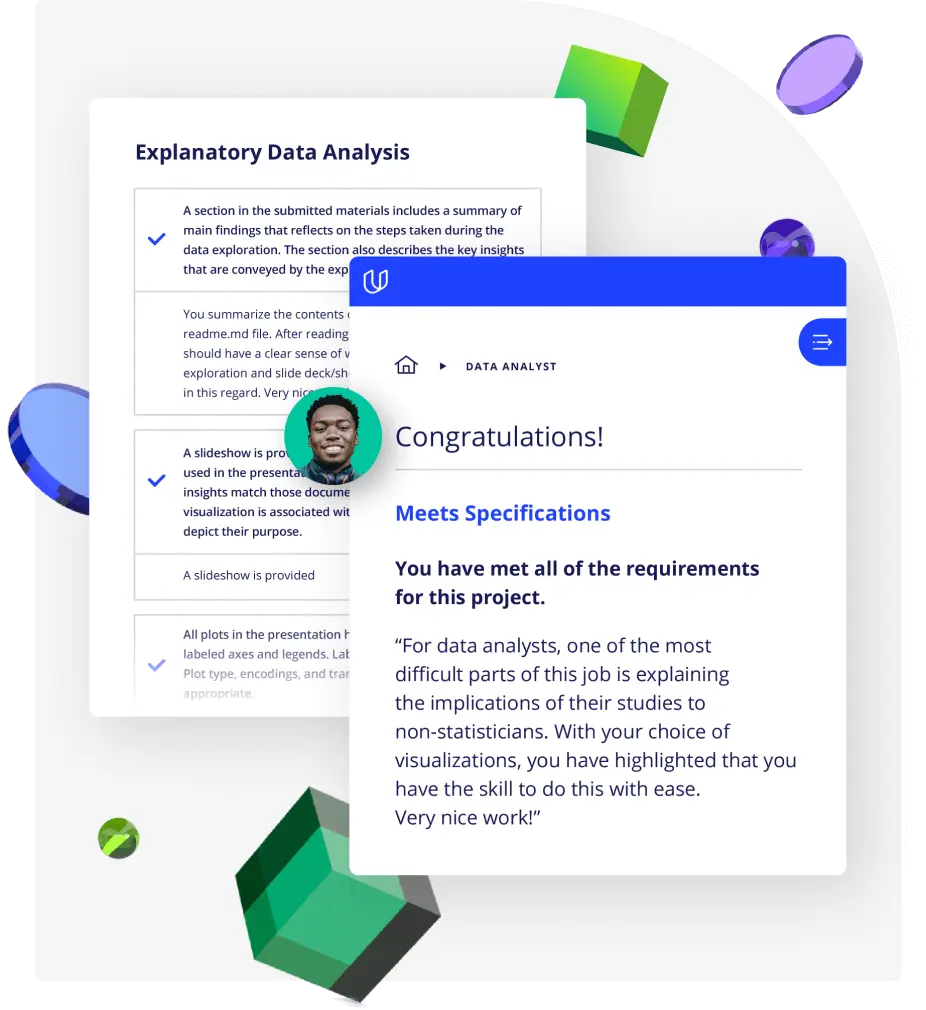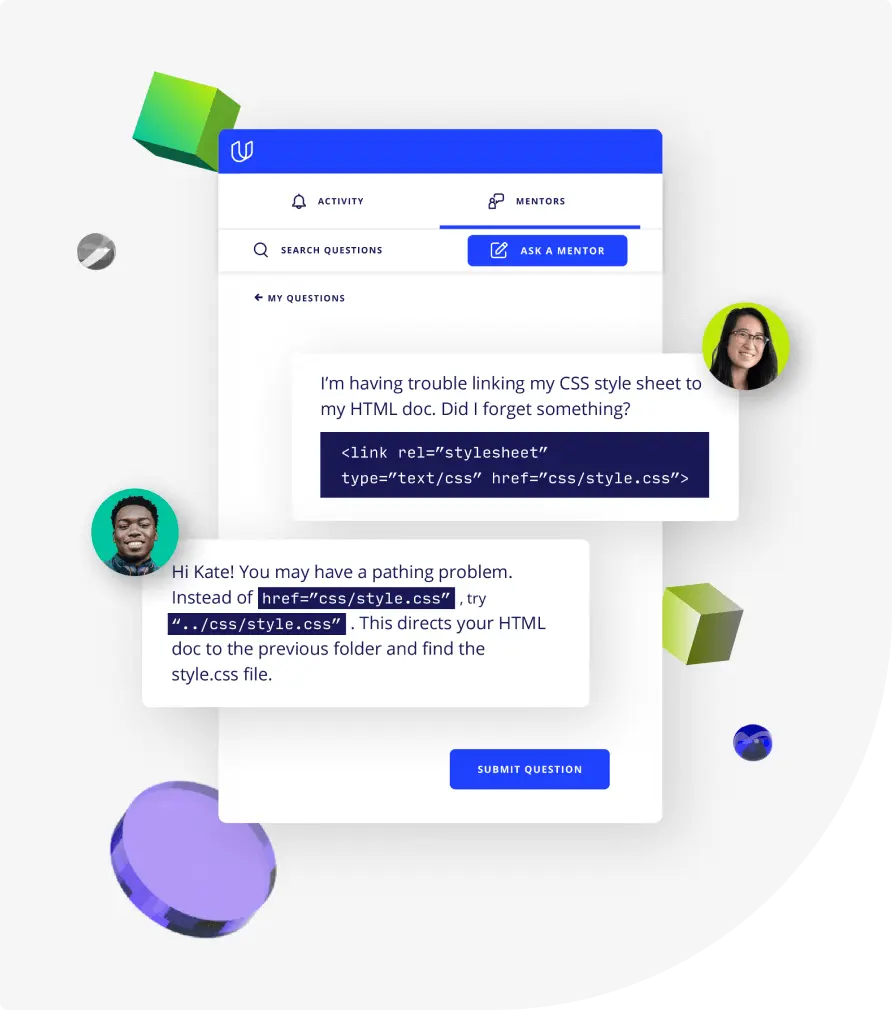
Mat Leonard
Content Developer
Mat is a former physicist, research neuroscientist, and data scientist. He did his PhD and Postdoctoral Fellowship at the University of California, Berkeley.

Nanodegree Program
The Deep Reinforcement Learning Nanodegree has four courses: Introduction to Deep Reinforcement Learning, Value-Based Methods, Policy-Based Methods, and Multi-Agent RL. Students learn to implement classical solution methods, define Markov decision processes, policies, and value functions, and derive Bellman equations. They learn dynamic programming, Monte Carlo methods, temporal-difference methods, deep RL, and apply these techniques to solve real-world problems. They learn to train agents to navigate virtual worlds, generate optimal financial trading strategies, and apply RL to multiple interacting agents.
The Deep Reinforcement Learning Nanodegree has four courses: Introduction to Deep Reinforcement Learning, Value-Based Methods, Policy-Based Methods, and Multi-Agent RL. Students learn to implement classical solution methods, define Markov decision processes, policies, and value functions, and derive Bellman equations. They learn dynamic programming, Monte Carlo methods, temporal-difference methods, deep RL, and apply these techniques to solve real-world problems. They learn to train agents to navigate virtual worlds, generate optimal financial trading strategies, and apply RL to multiple interacting agents.
Advanced
2 months
Real-world Projects
Completion Certificate
Last Updated April 21, 2024
Course 1 • 1 day
Course 2 • 4 weeks
Apply deep learning architectures to reinforcement learning tasks. Train your own agent that navigates a virtual world from sensory data.
Course 3 • 4 weeks
Course 4 • 3 weeks

Content Developer
Mat is a former physicist, research neuroscientist, and data scientist. He did his PhD and Postdoctoral Fellowship at the University of California, Berkeley.

Content Developer
Miguel is a software engineer at Lockheed Martin. He earned a Masters in Computer Science at Georgia Tech and is an Instructional Associate for the Reinforcement Learning and Decision Making course. He's the author of Grokking Deep Reinforcement Learning.

Content Developer
Chhavi is a Computer Science graduate student at New York University, where she researches machine learning algorithms. She is also an electronics engineer and has worked on wireless systems.

Content Developer
Dana is an electrical engineer with a Masters in Computer Science from Georgia Tech. Her work experience includes software development for embedded systems in the Automotive Group at Motorola, where she was awarded a patent for an onboard operating system.

Curriculum Lead
Cezanne is an expert in computer vision with a Masters in Electrical Engineering from Stanford University. As a former researcher in genomics and biomedical imaging, she's applied computer vision and deep learning to medical diagnostic applications.

Curriculum Lead
Alexis is an applied mathematician with a Masters in Computer Science from Brown University and a Masters in Applied Mathematics from the University of Michigan. She was formerly a National Science Foundation Graduate Research Fellow.

Instructor
Arpan is a computer scientist with a PhD from North Carolina State University. He teaches at Georgia Tech (within the Masters in Computer Science program), and is a coauthor of the book Practical Graph Mining with R.

Instructor
Luis was formerly a Machine Learning Engineer at Google. He holds a PhD in mathematics from the University of Michigan, and a Postdoctoral Fellowship at the University of Quebec at Montreal.

Content Developer
Juan is a computational physicist with a Masters in Astronomy. He is finishing his PhD in Biophysics. He previously worked at NASA developing space instruments and writing software to analyze large amounts of scientific data using machine learning techniques.
Average Rating: 4.6 Stars
328 Reviews
Combine technology training for employees with industry experts, mentors, and projects, for critical thinking that pushes innovation. Our proven upskilling system goes after success—relentlessly.

Demonstrate proficiency with practical projects
Projects are based on real-world scenarios and challenges, allowing you to apply the skills you learn to practical situations, while giving you real hands-on experience.
Gain proven experience
Retain knowledge longer
Apply new skills immediately

Top-tier services to ensure learner success
Reviewers provide timely and constructive feedback on your project submissions, highlighting areas of improvement and offering practical tips to enhance your work.
Get help from subject matter experts
Learn industry best practices
Gain valuable insights and improve your skills

Unlimited access to our top-rated courses
Real-world projects
Personalized project reviews
Program certificates
Proven career outcomes
Full Catalog Access
One subscription opens up this course and our entire catalog of projects and skills.
Average time to complete a Nanodegree program

Deep Reinforcement Learning